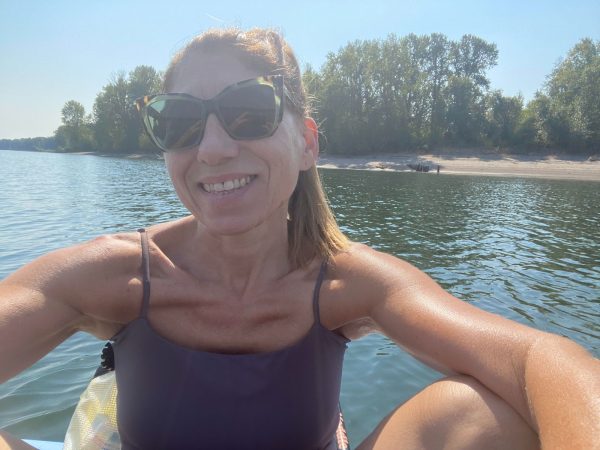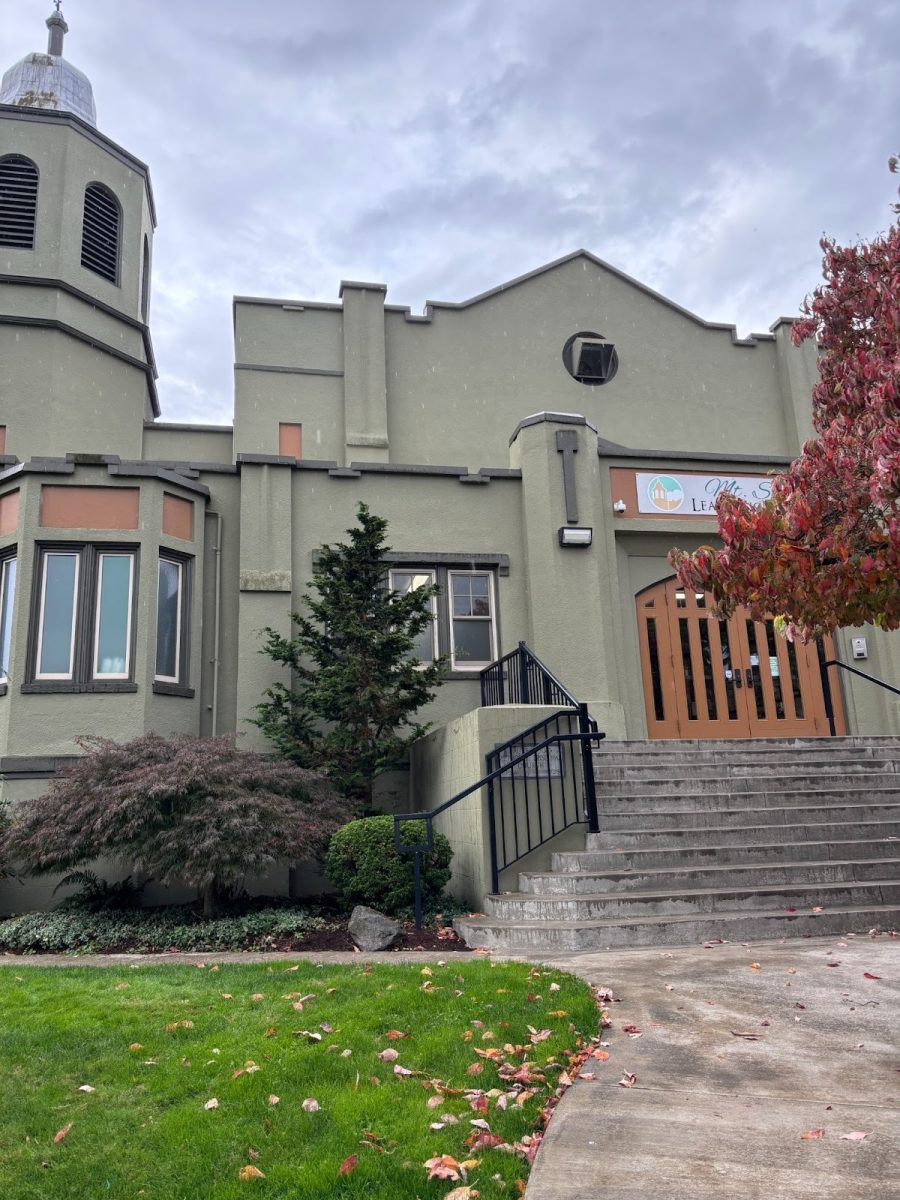
As the school year starts up again, the French program welcomes Isabelle Colard-Tyler, an exciting addition to the Franklin community. With her 16 years of teaching experience both in the United States and internationally, the French program is glad to have her.
According to Colard-Tyler, she has always wanted to teach. “I like to help people grow,” she says. “I feel that I am also a life coach. It is a natural thing to do for me.” She has a holistic approach to teaching. “I teach the entire human being and I take into account [my] students’ challenges at home and in the classroom,” Colard-Tyler explains.
“It’s pretty exciting to get a new teacher, especially one that is from France,” says Daphne Anderson, a sophomore in French 7-8. “She seems very kind and like she’s invested in everybody’s learning experience.”
Colard-Tyler’s teaching career is much more extensive than it may seem. Although she’s from France, she’s taught all over the world, from New Orleans to Puerto Rico. “To be truthful, I love all the places I’ve lived in,” Colard-Tyler says. However, Kuwait and Dubai stand out especially. Adapting to new cultures and cities can be daunting at first, but she has always found ways to be at home wherever she and her family ended up. “When you teach in a large school full of students and teachers from all over the world, you develop special relationships, with some of your colleagues becoming your friends,” she says. “You have your own apartment with your family and your two cats, you create a new community, you transform yourself, you open your mind, and you adopt that new country.”
“I was proud to live in Kuwait,” Colard-Tyler says. “It was an opportunity to learn more about the history of [the] country.” Her university degree is in history, architecture, and art, so while she adored the streets occupied by feral cats, she also appreciated the impressive buildings and structures around the city.
In Dubai, Colard-Tyler developed communities and relationships with people from all over the world, including India, Spain, and Canada. She especially connected with her French students at the Dubai American Academy. “[They] were exceptional, really,” she says.
She and her family lived in the heart of the city. Since French is often spoken in this part of the world, Colard-Tyler was able to really strengthen her understanding of the culture and language. When Colard-Tyler wasn’t teaching, she loved to start her weekends with a “two-hour yoga session at a gorgeous park, created entirely in a land of sand.” Colard-Tyler expresses the peaceful energy of these special moments. It was “early enough to be often alone for a few hours,” she says.
Later in the day, Colard-Tyler usually met with her children to spend an afternoon exploring Old Dubai. There, they enjoyed the art galleries, unique architecture, and ancient courtyards. “Often, I had lunch in this beautiful courtyard on Saturdays. I really loved to be in this part of the town because I loved the architecture, how narrow the streets were, the wind from the Creek going through, and the sense of history,” she says. “I liked the fact that we [could] see the sand. Dubai is a city born from the sand.” After a week of heavy teaching, Colard-Tyler enjoyed driving around Sheik Zayed Avenue while taking in the beauty of the city, especially the towering Burj Khalifa. Then, she would head over to Sunset Beach where she could spend some time by herself — reading and swimming.
Teaching internationally comes with its challenges. In Kuwait and Dubai, Colard-Tyler didn’t have the support or protection of a teachers union like public school teachers in Oregon. Teaching in Kazakhstan was a unique experience as well. “I had the opportunity to teach for a private university: Kazguu.” There, Colard-Tyler taught a course she created: Intercultural Communication, a class taught in English to future professionals in hospitality, tourism, and translation.
In this course, Colard-Tyler utilized problem-based learning and focused on a variety of topics including self-awareness, emotional intelligence, the value of time in societies, individualism versus collectivism, and high context versus low context cultures. Her classes participated in role plays, thoughtful in-class discussions, and cooperative learning. Colard-Tyler’s students were also strongly encouraged to come up with creative ideas and to work with one another to stay actively involved. “I am using a holistic approach of the student, theater techniques, [and a] kinesthetic teaching style,” she explains.
Unlike Kuwait’s desert climate, the beautiful white landscape of Kazakhstan was very different: extreme cold, ice, and wind. “I could wait for a bus for five minutes and then I was literally frozen. I liked the experience. I liked to walk at night under the stars, into the deep snow. I always felt so safe, so happy,” she says. Even though it could get down to minus 25 degrees Fahrenheit in the winter, she and her team of Kazakh professors powered through the extreme temperatures with high spirits. Colard-Tyler enjoyed how peaceful and authentic life was in Kazakhstan. “I liked how the people were very courageous, honest, strong, proud, [and] hopeful for their future and the future of their children,” she says. “I will keep always in my heart that wonderful experience.”
During the start of COVID-19, Colard-Tyler moved to Portland. She was able to get a job at Portland Public Schools within six weeks of her and her family’s arrival. Before Franklin, Colard-Tyler taught both French and AVID at Robert Gray Middle School where she crafted her curriculum after her international experience.
Over time, Colard-Tyler has developed an expertise and a passion for language acquisition. “I have developed an interest in coaching [the] French language and mentoring students to strengthen their confidence,” she says. Not only does learning a second language significantly improve one’s cognitive abilities, it also opens doors to new cultural understandings and deeper connections with others.
As a creative and rigorous teacher, with extensive teaching experience, Colard-Tyler utilizes a kinesthetic teaching style, focusing on pronunciation and expression of emotions to help her students acquire a strong base in grammar and thematic vocabulary. “My goal is also for my students to think critically about global topics within the cultural variety of the Francophone world, as well as to express their ideas and opinions in an organized manner, and to prepare them for continuing their French studies in France or at the university,” she explains. In the classroom, Colard-Tyler implements hands-on learning strategies. She encourages her students to take breaks each period to get them out of their seats and move. This year, she plans to take her classes to places across the city where her students can learn more about French culture.
So far, Colard-Tyler is enjoying her time at Franklin. “I feel very fortunate to have this position of French teacher at Franklin. It is today a very rare position since a lot of French programs have been cut,” she says. “I am very lucky to have such a wonderful team.” She admires that Franklin’s World Languages department is reflecting a desire from the administration for authenticity and quality. “[They’re] valuing a true cultural and linguistic identity from their teachers,” she explains.
When asked what she is looking forward to this year as a part of the French program, Anderson answers, “to continue my education and get new perspectives.” This year, many Franklin students want to take French. “I feel like it’s a very safe community. It’s very encouraging for kids who are learning how to speak a language for the first time.” Although the school year is just getting started, Franklin is grateful to have Colard-Tyler join the community. “She seems very kind and energetic and like she has a really good understanding of the language,” Anderson says.
Colard-Tyler is doing her best to fulfill her mission, to give her students the desire and the motivation to learn and to develop their skills as well as to open their minds to other cultures of the vast Francophone world. She says, “I want to be fun but also rigorous. It is my responsibility to make the learning experience attractive and efficient to [keep] the French program alive at Franklin.”



































